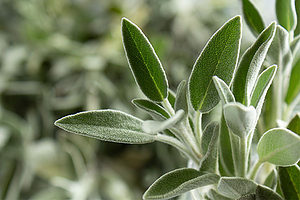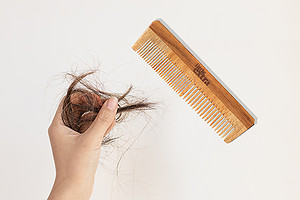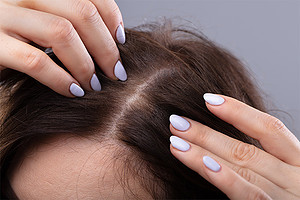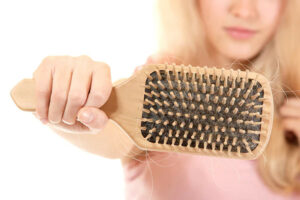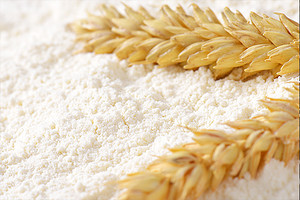The use of sunscreen has great significance for the skin and body as it shields skin from UV damage and skin cancer. (1)
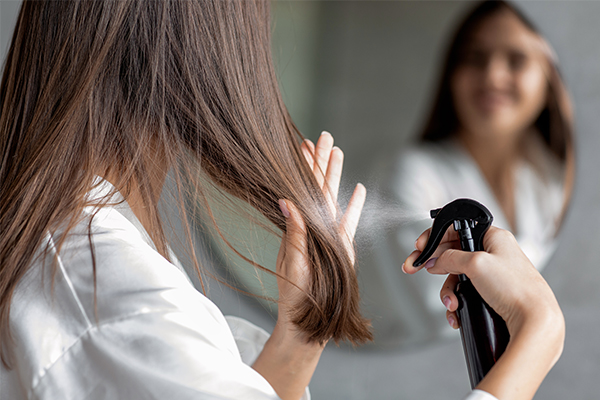
But aside from its use on the skin, sunscreen is also beneficial for the hair and scalp, as researchers concluded that it protects the hair and scalp from harmful sunrays. (2)
Therefore, it is imperative to wear sunscreen in the summer to complete your hair care routine and protect your exposed hair and scalp from UV damage.
UV radiation can harm your hair fibers, causing rough hair texture, dryness, breakage, increased stiffness, lost luster, color fading, and brittleness as well as scalp inflammation and skin cancer. (3)
So, wear sunscreen when going outdoors.
Read below to learn more about the benefits and types of sunscreen for the hair and scalp.
Article Contents
Why Is Sunscreen Necessary for the Hair and Scalp?
Sun exposure can cause damage to your hair and scalp in multiple ways.
A study reported that your hair color, structure, and health can weaken due to UV radiation. (4) It leads to split ends, color fading, dryness, fizziness, brittleness, and hair loss. (3)
The sun also causes scalp burning, leading to inflammation, peeling, pain, and increased skin cancer risk.
One study reported that thick and dense hair can protect the scalp skin from sun damage but cannot block all UV rays. (5) This is why sunscreen is important for scalp health.
Hair sunscreen helps maintain the color and hydration levels of your hair and makes it shinier.
Thus, applying sunscreen on your hair and scalp keeps all the problems at bay, giving you beautiful, healthy hair.
Benefits of Using Sunscreen on the Hair and Scalp
The benefits of sunscreen for the hair and scalp are as follows.
1. It protects against UV rays
Hair and scalp sunscreen protects your hair and scalp from the harmful and damaging UV rays, as excessive sun exposure can damage the hair.
For instance, damaged hair cuticles lead to split ends. (6)
According to a study, hair care products such as shampoos with sunscreen filters alleviate UV damage to the hair. (7)
2. It prevents color fading
The harmful UV rays can lead to color changes or fading. (8) There are specially formulated sunscreens that shield the hair and scalp from cuticle separation, dryness, and color fading. (6)
Sunscreens are more important for bleached or colored hair, which is more prone to sun damage.
3. It improves hair manageability
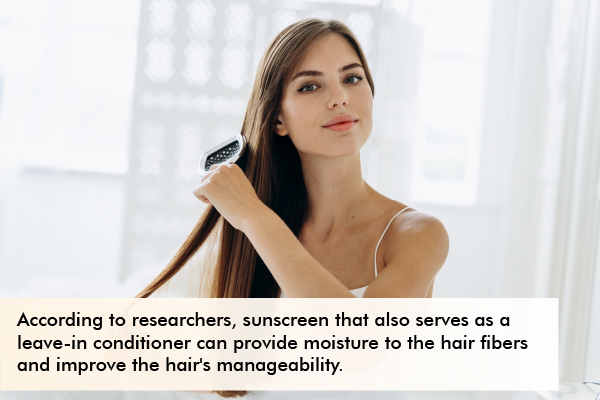
According to researchers, sunscreen that also serves as a leave-in conditioner can provide moisture to the hair fibers and improve the manageability of the hair.
Moreover, sunscreen makes managing the hair easy by slowing the weathering process. (9)
4. It protects the hair and scalp from sun damage
Researchers say sunscreen damage can reduce hair protein damage. (10) Additionally, hair care products such as shampoos with sunscreen filters decrease sun damage. (7)
For thin and fine hair, a scalp sunscreen protector with SPF is needed as it protects the hair and scalp from the damaging UV rays of the sun. It is specially formulated for people with less hair on the scalp. (11)
According to researchers, sun protection sprays are suitable for scalp application. (12) One study found that sunscreen containing a caffeine formulation can protect the hair follicles of the scalp from UV radiation. (13)
Different Types of Sunscreen for the Hair and Scalp
The different types of sunscreen for the hair and scalp are as follows.
1. Spray
Hair spray sunscreen is a lightweight and convenient option and is excellent for scalp protection. You can easily apply it to your scalp’s exposed regions, such as the hairline and part line. (14)(15)
2. Powder
Powdered sunscreen is an oil-free and mess-free option for the hair and scalp. You can apply it using a brush or puff. It provides refreshment to the hair between washes by absorbing excess oil.
3. Mousse
Mousse sunscreen is applied to dry or damp hair and is a volumizing and creamy option. It gives hair hold and texture and doesn’t weigh it down.
How to Choose Sunscreen for the Hair and Scalp?
Look for the following features in sunscreen for the hair and scalp.
SPF
Sun protection factor (SPF) refers to the potential of the sunscreen in shielding from sunburn. High SPF means higher protection.
SPF products are low (SPF 6, 10), medium (SPF 15, 20, 25), or very high (SPF 50+). They shield you from specific wavelengths of UV rays. Such products have a UVA seal. (7)
However, sunscreen cannot block all UV rays, so it is still advisable to wear a scarf or hat and stay in the shade even if wearing hair and scalp sunscreen.
Broad spectrum
Researchers report that the spectrum of UV radiation ranges from 40 nm to 400 nm. So, look for a broad-spectrum UVA and UVB sunscreen with a better benefit-risk ratio. They give better protection from UVA bands and are non-allergic and non-toxic. (16)
So, go for a broad-spectrum sunscreen for better protection against UVA and UVB rays.
Water resistance
Sunscreen with water-resistant properties doesn’t get washed off by sweat or water for some time, usually for 40–80 minutes.
Researchers claim that water-resistant sunscreen still has half (50%) or more sun protection power after contact with water. (17) However, you still need to reapply sunscreen after towel-drying your hair or every 2 hours.
Hair type
Different hair types have different sunscreen requirements. For instance, dry and damaged hair needs a hydrating and nourishing sunscreen with extracts or oils.
Fine and oily hair needs oil-free and lightweight sunscreen that adds volume to the hair by absorbing excess oil.
How to Apply Sunscreen to the Hair and Scalp
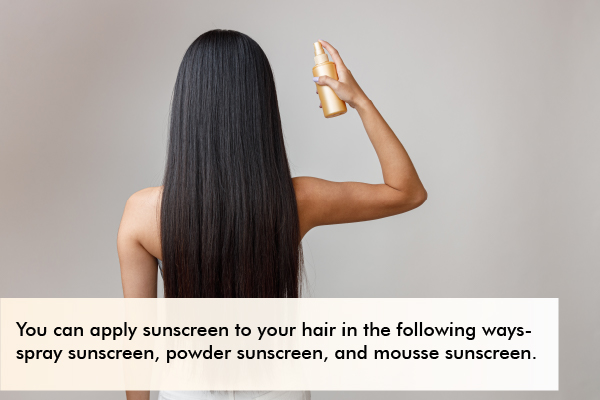
You can apply sunscreen to your hair in the following ways.
Spray sunscreen
- Shake the hair spray sunscreen bottle well before applying.
- Hold the spray bottle 6 inches away from your scalp. Spray it evenly over the exposed regions of the scalp, such as the hairline and part line.
- Using your fingertips, massage the spray into your hair and scalp.
Powder sunscreen
- Choose powdered sunscreen that is translucent or matches your hair color.
- Apply it to dry hair along the hairline and part line.
- Using a brush or your fingertips, massage this powder gently on your scalp.
- Repeat this process on other exposed regions of the scalp.
Mousse sunscreen
- Choose a mousse sunscreen that has a high SPF and is water resistant.
- Shake the container well before using, and put tiny portions of mousse into your palm.
- Apply it to your hair roots and scalp. Focus more on the scalp’s exposed regions, such as your hairline and part line.
- Using your fingertips, massage it into your scalp until it is absorbed.
Note:
- Reapply sunscreen every 2 hours or frequently if your swim or sweat.
- Keep powder, spray, or mousse sunscreen away from your mouth or eyes. Rinse well with water immediately if there’s any contact with the eyes or mouth.
Homemade Sunscreen to Protect Your Hair and Scalp
You can make homemade sunscreen for your hair and scalp using ingredients avocado, coconut, and aloe vera.
Researchers report that coconut oil-based products may prevent hair damage induced by protein loss during sun exposure or grooming. (18)
Aloe vera is a natural shield that blocks UVA and UVB rays and keeps natural moisture intact. (19)
Avocado oil has natural sunscreen properties that protect the hair and scalp from the sun’s harmful UVA and UVB rays. (20)
How to use:
- Mix 1 tbsp of avocado oil, 2 tbsp of coconut oil, and 3 tbsp of aloe vera gel in 40 ml of water.
- Keep it in a hair spray bottle.
- Shake the spray bottle well before use.
- Apply the spray to your hair before leaving the house.
General Queries
Which hair types (black, white, and gray) need sunscreen?
Hair isn’t susceptible to skin cancer or sunburn unlike the skin, but sun exposure can affect your hair, and every hair type can benefit from sun protection.
Continuous sun exposure can lead to hair brittleness, damage, dryness, and color fading (in dyed hair) and overall hair health degradation. According to researchers, lighter hair color tones, such as gray, white, or blonde, are more prone to sun damage than darker hair.
Thus, you must apply sunscreen and wear hats to shield your hair and scalp, especially if you have a lighter hair color. (21)
How should sunscreen be stored?
Sunscreen can keep its original strength for approximately 3 years, but improper storage can spoil it. Store sunscreen in a cool and dry place.
Toss out the sunscreen if it’s past its expiration date or if there is a change in its consistency or color.
Final Word
Regularly using sunscreen is necessary to give the hair and scalp sun protection and improve their condition and appearance. You can use sunscreen in different forms, such as lotions, powders, or sprays, and apply them frequently and moderately.
Review your product’s label for the instructions, ingredients, and SPF. Speak to your hairstylist or dermatologists if you have any concerns.
References
- Sander M, Sander M, Burbidge T, Beecker J. The efficacy and safety of sunscreen use for the prevention of skin cancer. CMAJ: Canadian Medical Association journal = journal de l’Association medicale canadienne. https://www.ncbi.nlm.nih.gov/pmc/articles/PMC7759112/. Published December 14, 2020.
- WO2001005363A1 – sunscreen for the scalp and hair. Google Patents. https://patents.google.com/patent/WO2001005363A1/en.
- Lee Y, Kim Y-D, Hyun H-J, Pi L-Q, Jin X, Lee W-S. Hair shaft damage from heat and drying time of hair dryer. Annals of dermatology. https://www.ncbi.nlm.nih.gov/pmc/articles/PMC3229938/. Published November 2011.
- Author links open overlay panelMichelli F. Dario, AbstractIn this paper the negative effects of solar radiation (ultraviolet, Herrling T, et al. Effects of solar radiation on hair and photoprotection. Journal of Photochemistry and Photobiology B: Biology. https://www.sciencedirect.com/science/article/abs/pii/S1011134415003206. Published October 8, 2015.
- Human hair as a natural sun protection agent: A … – wiley online library. https://onlinelibrary.wiley.com/doi/10.1111/php.12433.
- MXPA02000455A – sunscreen for the scalp and hair. Google Patents. https://patents.google.com/patent/MXPA02000455A/en.
- Latha MS, Martis J, Shobha V, et al. Sunscreening Agents: A Review. The Journal of clinical and aesthetic dermatology. https://www.ncbi.nlm.nih.gov/pmc/articles/PMC3543289/. Published January 2013.
- Must-try summer hair care. American Academy of Dermatology. https://www.aad.org/public/everyday-care/hair-scalp-care/hair/summer-hair-care.
- Monselise A, Cohen DE, Wanser R, Shapiro J. What ages hair? International journal of women’s dermatology. https://www.ncbi.nlm.nih.gov/pmc/articles/PMC5419032/. Published February 16, 2017.
- Draelos ZD. Care of aging hair and photoprotection. SpringerLink. https://link.springer.com/chapter/10.1007/978-3-642-02636-2_17. Published January 1, 1970.
- US20060233726A1 – SPF Scalp Sun screen protector. Google Patents. https://patents.google.com/patent/US20060233726A1/en.
- Dale Wilson B, Moon S, Armstrong F. Comprehensive Review of Ultraviolet Radiation and the current status on Sunscreens. The Journal of clinical and aesthetic dermatology. https://www.ncbi.nlm.nih.gov/pmc/articles/PMC3460660/. Published September 2012.
- Gherardini J, Wegner J, Chéret J, et al. Transepidermal UV radiation of scalp skin ex vivo induces hair follicle damage that is alleviated by the topical treatment with caffeine. International journal of cosmetic science. https://www.ncbi.nlm.nih.gov/pmc/articles/PMC6850087/. Published April 2019.
- Canavan TN, McClees SF, Duncan JR, Elewski BE. Lichen planopilaris in the setting of hair sunscreen spray. Skin appendage disorders. https://www.ncbi.nlm.nih.gov/pmc/articles/PMC6388555/. Published February 2019.
- Expert consensus on the use of Sunscreen Agents: Indian perspective. https://www.researchgate.net/publication/357319408/.
- Naik MS, Polad RJ, Joshi MM, Ligade VS. Global trends of sunscreen research literature: A bibliometric analysis over the period of 2010-2020. Journal of cutaneous and aesthetic surgery. https://www.ncbi.nlm.nih.gov/pmc/articles/PMC9364452/. Published 2022.
- Geoffrey K, Mwangi AN, Maru SM. Sunscreen products: Rationale for use, formulation development and regulatory considerations. Saudi pharmaceutical journal: SPJ: the official publication of the Saudi Pharmaceutical Society. https://www.ncbi.nlm.nih.gov/pmc/articles/PMC6978633/. Published November 2019.
- TC; W. Health effects of coconut oil-a narrative review of current evidence. Journal of the American College of Nutrition. https://pubmed.ncbi.nlm.nih.gov/30395784/.
- Review article natural sunscreen agents: A review – researchgate. https://www.researchgate.net/publication/259457834/.
- Scientific Research Publishing. Documentation and phytochemical screening of traditional beauty products used in Missenyi District of Tanzania. Journal of Cosmetics, Dermatological Sciences and Applications. https://www.scirp.org/html/9-1050270_52246.htm. Published November 12, 2014.
- International Journal of Women’s Dermatology – Researchgate. https://www.researchgate.net/publication/313792549/.


